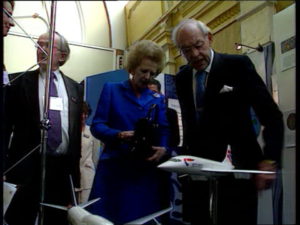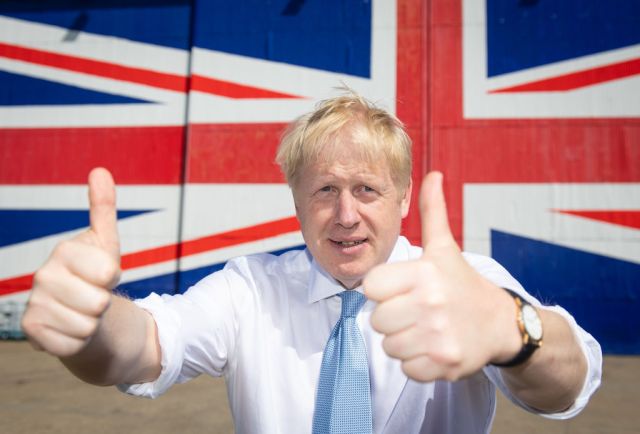Culture warrior or Credit: Dominic Lipinski – WPA Pool/Getty

Did Boris Johnson really need to splash out nearly a million on a patriotic paint job for his official plane? His decision was met with fury (over the cost) and ridicule (because the Union flag on the tail was upside down). But neither response was justified.
As the Foreign Secretary, Dominic Raab, snapped to a reporter, painting a plane “is not like painting your bicycle”. And the stated cost, £900,000, is a fraction of the £87m the Government was shamed into spending on school meal vouchers for the summer holidays, itself a tiny fraction of the whole pandemic spending. The Ministry of Defence, for its part, said that there was a particular way of depicting a flag on a plane and, according to this, the Union flag was absolutely the right way up.
There was a third criticism, though, which was the most seductive: in ordering this distinctive new livery, the PM was over-reaching. With echoes of the 2005 controversy over Tony Blair’s reported desire for a “Blair Force One”, Boris Johnson was accused of aspiring to a privilege that was beyond his status. A special, named, plane was something that was appropriate for a head of state — a US or French President — not for a mere head of government.
But this idea that it is somehow inappropriate for our Prime Minister to have a liveried plane when travelling on official business needs to be challenged. To see an anonymous, sometimes even commercially chartered, plane delivering a British prime minister, then taxi-ing to take its place on the tarmac alongside half a dozen or so proudly branded national planes is not a good look — and, yes, in international diplomacy, looks matter.
Let’s not forget that divorced from the European Union, the UK reverts to being a medium-sized country needing to make its own way in the world. The catchphrase favoured by the Government is “Global Britain”. If the UK is to cut a figure in the world that matches up to the name, however, it’s going to have to address our national branding.
And planes are great brand ambassadors. Mrs Thatcher was not wrong when she condemned British Airways for their ‘ethnic’ tail fin art in 1997. She understood that the design for a national flag-carrier said something about the country, and that that something needed to be identifiable and positive. It is a sentiment shared around the world. Shortly after the collapse of the Soviet Union, I remember seeing workmen up ladders alongside planes parked at Moscow’s Sheremetyevo airport. They were from the Baltic States, and they were repainting the planes they had appropriated from the Soviet company, Aeroflot, in the colours of their restored nations.

Cars matter, too. Recent UK Prime Ministers have been driven around in custom-built Jaguars (forget, for a moment, that Jaguar Land Rover is now a subsidiary of the Indian company, Tata). Where countries have a national car-maker, this will be the marque provided for their ambassadors abroad, whose cars will often have their own “flag” plates too. The French ambassador is conveyed around the UK in a sleek Citroen, FRA1. Italy’s diplomats have a fleet of white Fiat 500s with bands in the national colours. Anonymity might confer security, but national status and identity have their own value as an ambassadorial car sweeps up to the Foreign Office — even if the summons is for a dressing down.
Some countries are much better at national branding than others, and larger ones — such as the United States or China — tend to act as though size or cultural sway means they don’t need to bother too much about image. Post-Soviet Russia seems only recently to have understood that it has a problem, assuming a particularly friendly face for the 2018 World Cup and beefing up its cultural projection abroad. France, meanwhile, exemplifies a medium-sized country with a strong sense both of its national brand and the need constantly to promote and protect it.
Ireland and Austria are small countries that have developed highly successful national brands. It is not simply that the very mention of Ireland conjures up an image of the shamrock and emerald green landscapes, a warm welcome to outsiders, and Guinness and folk music in pubs, it is that the country has consistently cultivated all these assets through its representations around the world. An Irish passport today is one of the most valuable — its holders requiring fewer visas to enter other countries than most.
A mark of its outsize international standing is that Ireland recently beat Canada to win one of the elected seats on the UN Security Council. The generally friendly feelings it inspires, plus its neutral defence status and its breathtaking transformation from a bastion of Catholic conservatism to a model of modern diversity all spoke in its favour. But so did the strength of its national identity. Ireland’s triumph was also seen as a major diplomatic setback for Canada and its Prime Minister, Justin Trudeau — such is the global competition to be an admired, national brand.
Austria, like Ireland, is a country that has benefited from its membership of the European Union, and in a similar way. Somehow, being part of a bigger grouping seemed to free these countries to become more essentially themselves. Austria has gone from being an insecure and exposed outpost of the West during the Cold War, to a confident and outgoing modern state, with its once imperial capital thoroughly up-to-date and spectacularly restored. Conchita Wurst’s Eurovision victory in 2014 seemed to set the seal on Austria’s new-old identity.
Vienna’s new international airport, completed eight years ago, is a model of what a national airport should be. Not only does it work, but it conveys an immediate sense of identity and place: from the Strauss scores adorning the walls of the arrival corridors to the waltzes piped into the public spaces to the promotion of Sachertorte in its cafes and shops. True, it is a little stereotypical and “cheesy”. But it is carried off with great verve and style, and what it tells you is that you have arrived in the capital of Austria, a country with pride in its own “brand”, and you could not be anywhere else in the world.
Entry points to a country provide important first impressions. In Britain, though, they often lack any genuine sense of place. Aside from a brief interlude during the Olympics, when images of Beefeaters and red phone boxes festooned London airports’ arrivals, the usual welcome is from walls plastered with adverts for international banks and foreign airlines. You could be anywhere in the no man’s land of the world; welcome to Britain, this is not.
Our national promotion, such as it is, also tends to be fragmentary — split up among separate tourist boards. As for trade and culture, the UK has run one of the clumsiest campaigns of any country I know, typified with huge posters, shouting “Trade is great; Great Britain”. Is this really the best that a country lauded around the world for the ingenuity and style of its advertising industry can do? Where is the imagination, the humour, the heritage and so much else that could, surely, constitute a worthy national brand?
Admittedly, national branding is a relatively recent concept, coined in the late 1980s by Simon Anholt. He’s a Briton, who went on to establish the ‘Good Country Index’ and gained a global reputation for his advice to governments on how to capitalise on their assets and project themselves internationally to best effect.
But it has taken the UK a long time to join the party — as if making any effort to cultivate a national brand was somehow beneath our country’s dignity. Or perhaps we saw ourself as a great power that did not have to worry about that sort of thing. Was it not obvious, from the Union flag through the Queen and the Beatles to the Houses of Parliament, what marked this country out as special?
The UK’s long-standing complacency about national branding may also have led it into a misunderstanding about the supposedly identity-suppressing nature of belonging to a wider grouping. As Anholt puts it in his new book, The Good Country Equation, “…collaborating to build a better world doesn’t mean national or political self-sacrifice: it boosts national standing and thus promotes growth and innovation”.
The current proliferation of official references to “Global Britain” suggests that the UK might finally be starting to take the business of national branding more seriously. Not only is Brexit throwing the UK back on its own reputational resources, but now the pandemic will also play a role. The UK’s tragically high death toll — among the the highest per capita in the world — cannot but diminish the country’s international standing. In an interview with the new Times Radio, the Prime Minister went so far as to call it “a disaster… an absolute nightmare for the country”.
Returning to basics on national branding could be a first step in trying to remedy this. Here is Anholt in his new book on what he asks foreign leaders soliciting his help: “What is your country for? What is its gift to the world? How can it make a difference to the whole of humanity, not just to its own citizens? How should a country make itself useful in
the 21st century and so earn its place in the world?”
Take away the rhetorical flourishes and, if the UK really wants to be Global Britain, these are some of the questions it is going to have to answer.










Join the discussion
Join like minded readers that support our journalism by becoming a paid subscriber
To join the discussion in the comments, become a paid subscriber.
Join like minded readers that support our journalism, read unlimited articles and enjoy other subscriber-only benefits.
Subscribe